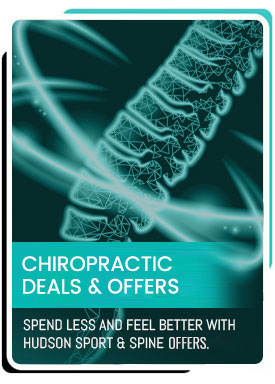Osteoporosis Treatment Specialist in Hoboken, NJ
Hudson Sport & Spine offers specialized osteoporosis treatments to strengthen bones and reduce fracture risk. Dr. Todd Givens, DC, and his team provide customized therapy plans to improve bone health, mobility, and overall well-being. Whether you’re managing bone loss or looking for preventive care, we are here to help. For more information, contact us today or schedule an appointment online. We are conveniently located at 70 Hudson Street, Suite 2B, Hoboken, New Jersey 07030.
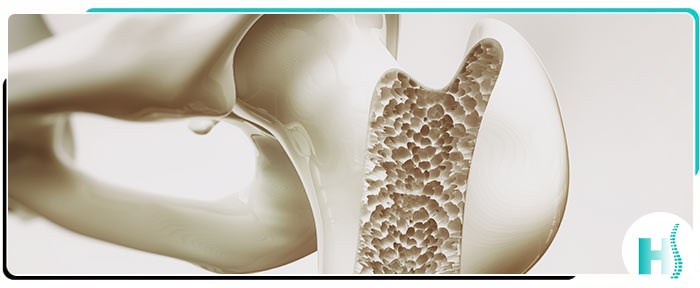
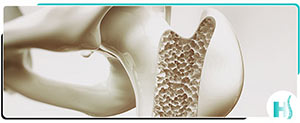
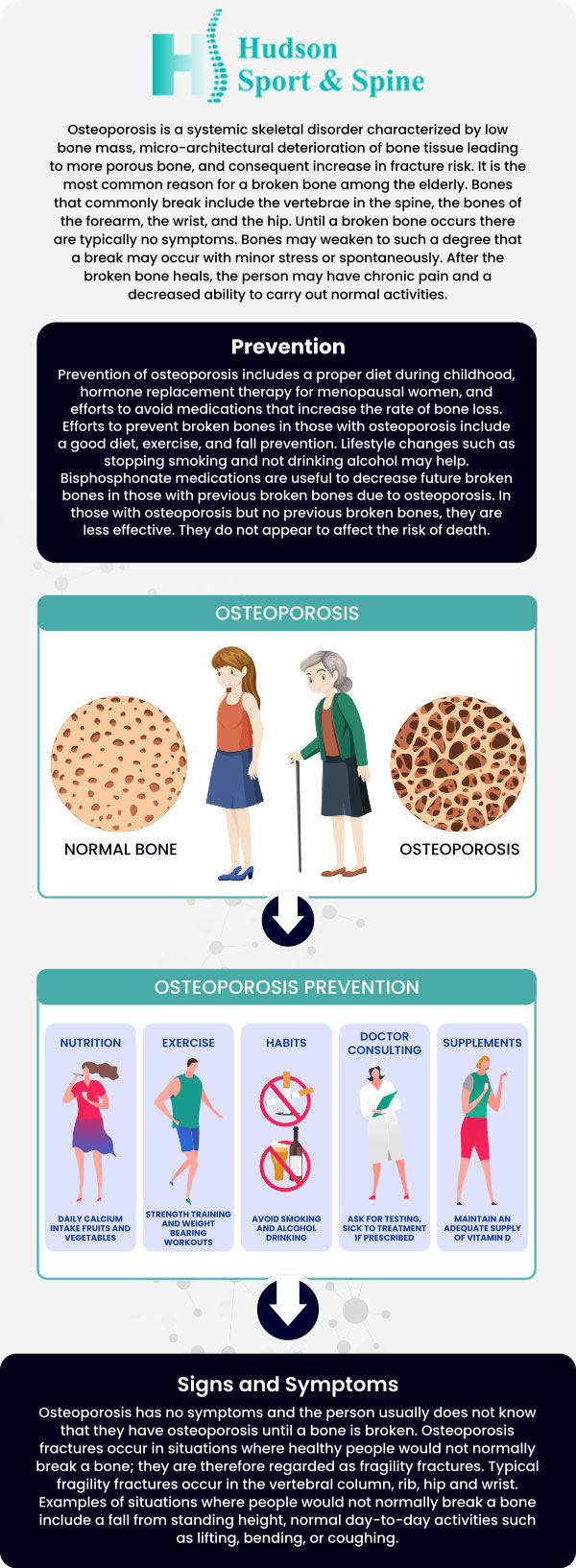
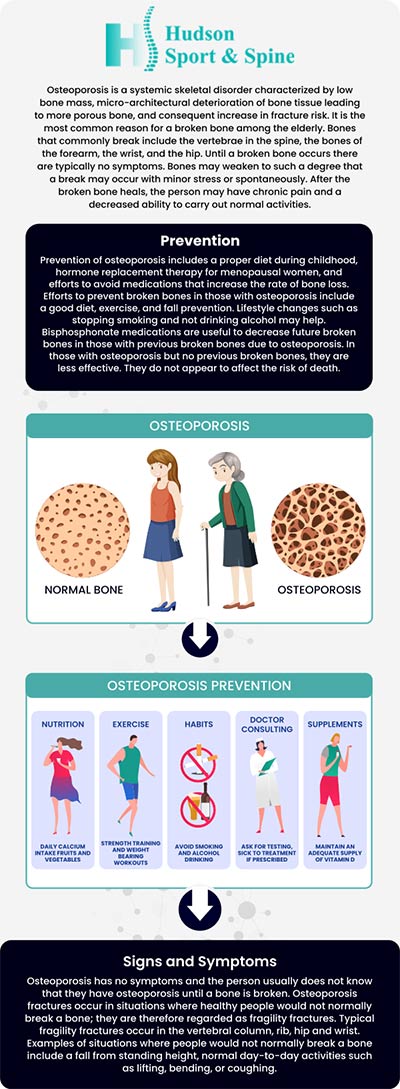
Table of Contents:
What are the symptoms of osteoporosis?
What not to do with osteoporosis?
Which bones are most affected by osteoporosis?
Does osteoporosis affect teeth?
Osteoporosis is often called a “silent disease” because it can progress without noticeable symptoms until a fracture occurs. As bone density decreases, individuals may experience signs such as back pain, a gradual loss of height, or a stooped posture. In more advanced cases, bones become fragile and prone to fractures, even from minor falls or everyday activities. Recognizing early symptoms and risk factors can help in the prevention and management of osteoporosis.
Common Symptoms of Osteoporosis:
● Bone Fractures: Increased susceptibility to fractures, especially in the spine, hips, and wrists.
● Back Pain: Fractured or collapsed vertebrae can cause persistent back pain.
● Loss of Height: Gradual height reduction over time due to weakened spinal bones.
● Stooped Posture: A hunched or curved upper back (kyphosis) due to spinal fractures.
● Weakened Grip Strength: Reduced bone and muscle strength affecting daily tasks.
● Limited Mobility: Difficulty with movement and balance, increasing fall risk.
Early detection through bone density testing and lifestyle modifications can help manage osteoporosis and reduce fracture risk.
At Hudson Sport & Spine, we recognize the importance of comprehensive care in managing osteoporosis, a condition that weakens bones, making them fragile and more prone to fractures. Our focus is on a holistic approach to bone health, integrating lifestyle management, medical oversight, and specialized therapies to support our patients. Understanding what not to do with osteoporosis can help in maintaining mobility and reducing complications.
What to Avoid with Osteoporosis:
● High-Impact Exercises: Activities like running, jumping, and heavy weightlifting can increase the risk of fractures. Opt for low-impact exercises such as walking, swimming, or yoga instead.
● Poor Posture: Slouching or bending forward can put excessive pressure on the spine, increasing the risk of vertebral fractures. Maintaining good posture helps support bone strength.
● Smoking and Excessive Alcohol: Both habits contribute to bone loss by interfering with calcium absorption and reducing bone density over time.
● Skipping Calcium and Vitamin D: A lack of essential nutrients weakens bones. Ensure a diet rich in calcium and vitamin D, or take supplements as recommended.
● Sedentary Lifestyle: Lack of movement can lead to muscle and bone weakening, increasing the risk of falls and fractures. Staying active with gentle exercises can help maintain bone health.
● Cluttered or Unsafe Environments: Loose rugs, poor lighting, and slippery floors can increase fall risk. Keeping living spaces safe and using supportive footwear can help prevent injuries.
By avoiding these risk factors and adopting bone-strengthening habits, individuals with osteoporosis can improve their overall health and reduce the likelihood of fractures.
Osteoporosis primarily affects bones that bear weight and are more susceptible to fractures due to their structure and function. The most commonly affected bones include those in the spine, hips, and wrists. These bones endure daily stress and, as bone density decreases, become more fragile and prone to fractures even from minor falls or normal movements. Because osteoporosis weakens the internal structure of bones, they lose strength over time, increasing the risk of breaks.
The spine (vertebrae) is one of the most affected areas, as these bones support the body’s weight and maintain posture. Osteoporosis-related fractures in the spine, also called compression fractures, can occur gradually, leading to a stooped posture, back pain, and loss of height. In some cases, these fractures may happen silently, without noticeable symptoms, until the spine becomes significantly weakened. Spinal fractures can severely impact mobility and quality of life.
The hips and wrists are also highly vulnerable to osteoporosis-related fractures. Hip fractures are particularly serious, often resulting from falls and leading to long recovery times or complications that may require surgery. Wrist fractures commonly occur when individuals try to break a fall with their hands. Since osteoporosis weakens bone density throughout the body, fractures in these areas can greatly affect independence and daily activities, emphasizing the importance of early detection and prevention strategies.
Hudson Sport & Spine is committed to empowering our patients with the knowledge and resources necessary to combat osteoporosis effectively. By focusing on early intervention and personalized care, we aim to enhance your mobility, reduce the risk of injury, and improve your overall well-being. Whether you are seeking preventative measures or need support managing an existing condition, our dedicated team is here to support you every step of the way.
Osteoporosis’s impact on the jawbone is a significant consideration, as reduced bone density can lead to challenges in dental stability and the success of treatments like implants or dentures. At Hudson Sport & Spine, we emphasize the importance of a collaborative care model. We encourage our patients to maintain open communication with both their medical and dental providers. This ensures that any dental treatments are approached with an understanding of the patient’s bone health status and current osteoporosis medications, such as bisphosphonates, which are linked to conditions like osteonecrosis of the jaw (ONJ).
Our team provides patient education on maintaining good oral hygiene and stresses the importance of regular dental check-ups as part of an osteoporosis management plan. By doing so, we aim to mitigate the potential impact of osteoporosis on oral health and ensure that our patients can enjoy a better quality of life.
For those seeking a holistic approach to managing osteoporosis and its effects, Hudson Sport & Spine offers a supportive environment where multidisciplinary care is prioritized. We are committed to helping our patients navigate the complexities of osteoporosis with personalized strategies that address both their general and oral health needs. For more information, contact us today or schedule an appointment online. We are conveniently located at 70 Hudson Street, Suite 2B, Hoboken, New Jersey 07030. We serve patients from Hoboken NJ, Jersey City NJ, Weehawken NJ, West New York NJ, Guttenberg NJ, Secaucus NJ, Harrison NJ, Kearny NJ, Newark NJ, Belleville NJ, North Bergen NJ, and Lyndhurst NJ.


